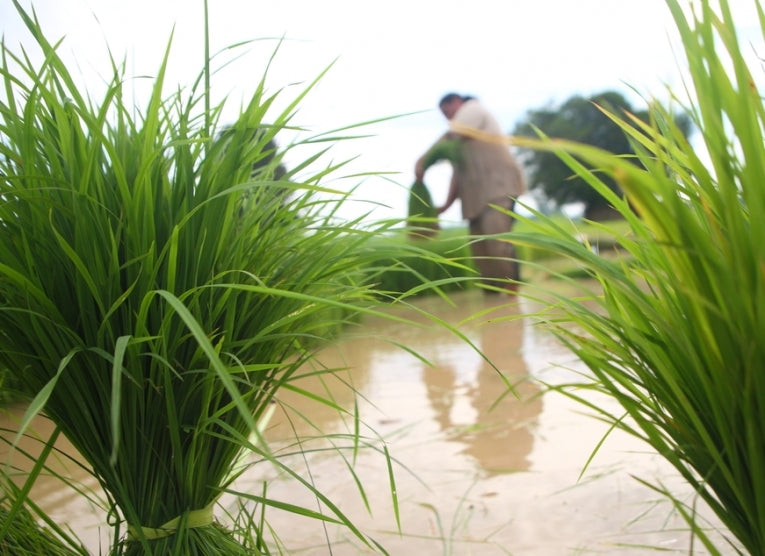From drought-stricken crops to pesticide-riddled farms; from the creeping GM takeover of farming, to rising food prices and warnings of famine - the drumbeat of bad news for small farmers in the developing world has been relentless. With more mouths to feed, in an era of climate change and extreme weather, many have argued that only genetically-modified seeds, from the giant agricultural companies, can save farming in countries like India.
But what's this? A chord of good news, breaking through the gloomy tones? A small farmer, in one of the poorest parts of India, breaking the world record for rice harvested per hectare? That's the promising note coming from the Indian state of Bihar.
And he bought in his staggering, record-breaking 22.4 tonnes per hectare (five times the usual yield) with nothing but some clever and careful nurturing of his crop - without a drop of pesticide, herbicide and fertilizer in sight. Not only that, but Sumant Kumar is far from the only farmer in Bihar to see yields rise. In fact, this impoverished state in the north-east of India saw its rice harvest leap from 3 million to 8 million tonnes in just 1 year. And it's all down to a new technique that is the very opposite of the high-tech, high-cost agriculture the developed world has so often pushed on developing-world farmers.
Getting intense with the nurturing
It's called System of Rice Intensification (or SRI), and it started with highland rice farmers in Madagascar. But its use is spreading far beyond rice, to crops like potatoes, tomatoes, wheat and peppers. At its heart is a simple organic approach, that looks to raise fewer, stronger plants, by ensuring the seedlings get off to flying start. Rice seedlings are transplanted when very young (and quickly too) aiming to keep the stress on the tiny roots to a minimum. Only 1 seed is planted per 'hill', and they are more widely spaced, so each plant can flourish.
SRI also aims for minimal watering, so the soil stays air-rich and loose, encouraging root growth. For the moment the SRI technique involves more work at the outset - more careful planting, and more frequent hoeing and dressing with manure. But with less seed used, no need for expensive fertilizers - and with the healthier plants generally not needing pesticides or herbicides - the payback for farmers from the increased yields seems more than worth the extra effort.
'My whole life has changed'
"In previous years, farming has not been very profitable," Sumant Kumar told the Guardian last week. "Now I realize that it can be. My whole life has changed. I can send my children to school and spend more on health. My income has increased a lot." There are dissenting voices, however. SRI has had a long and rocky path towards adoption, as conventional agricultural scientists and labs have poo-pooed the idea that yield increases can be achieved so simply. One hold-out critic is Yuan Longping, a leading Chinese researcher credited with the development of hybrid rice varieties.
He told the South China Morning Post that the record yield was "120 per cent fake", and dismissed the Indian government's verification of the harvest. "How could the Indian government have confirmed the number after the harvesting was already done?" Yuan Longping is the previous record holder for the highest rice yield per hectare (at 19 tonnes). But the Bihar government fiercely defends the results they are seeing from SRI, which they said was done in front of independent witnesses.
Go to the fields and see..
If they are right, SRI could be a game-changer for the world's hundreds of millions of small farmers - and for ensuring a more sustainable future for agriculture. Amir Kassam, a former director of the UN's agricultural research organization, CGIAR, has a message for the doubters, which he passed on through the Guardian. "I would say to them, 'go to the fields and see the evidence'. There are now close to a million hectares under SRI and that cannot be regarded as a delusion. It is real."










